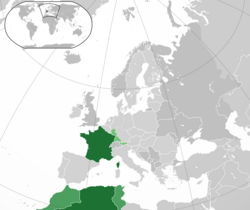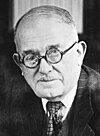Provisional Government of the French Republic
This article needs additional citations for verification. (October 2022) |
French Republic République française (French) | |||||||||||||||||
|---|---|---|---|---|---|---|---|---|---|---|---|---|---|---|---|---|---|
| 1944–1946 | |||||||||||||||||
| Motto: " Liberté, Égalité, Fraternité" "Liberty, Equality, Fraternity" | |||||||||||||||||
| Anthem: "La Marseillaise" | |||||||||||||||||

| |||||||||||||||||
| Status | Military occupation | ||||||||||||||||
| Capital | Algiers (de facto, 3 June – 31 August 1944) Paris (de jure; de facto from 31 August 1944) | ||||||||||||||||
| Common languages | French | ||||||||||||||||
| Religion | Secular state
In Alsace-Lorraine: | ||||||||||||||||
| Government | Tripartisme | ||||||||||||||||
| Chairman | |||||||||||||||||
• 1944–1946 | Charles de Gaulle | ||||||||||||||||
• 1946 | Félix Gouin | ||||||||||||||||
• 1946 | Georges Bidault | ||||||||||||||||
• 1946–1947 | Léon Blum | ||||||||||||||||
| Legislature | Fourth Republic | 27 October 1946 | |||||||||||||||
| Currency | French franc | ||||||||||||||||
| |||||||||||||||||
The Provisional Government of the French Republic (PGFR; French: Gouvernement provisoire de la République française (GPRF)) was the provisional government of Free France between 3 June 1944 and 27 October 1946, following the liberation of continental France after Operations Overlord and Dragoon, and lasting until the establishment of the French Fourth Republic. Its establishment marked the official restoration and re-establishment of a provisional French Republic, assuring continuity with the defunct French Third Republic.
It succeeded the
Its principal mission (in addition to the war) was to prepare the ground for a new constitutional order that resulted in the Fourth Republic. It also made several important reforms and political decisions, such as granting women the right to vote, founding the École nationale d'administration and laying the grounds of social security in France.
Creation
The PGFR was officially created by the CFLN on 3 June 1944, the day before
After the
War
The GPRF set about raising new troops to participate in the
The
The spearhead of the Free
They participated in stopping
Position on the Vichy regime
At the Hôtel de Ville, Paris on 25 August 1944, where the French Second Republic and French Third Republic had been declared, de Gaulle explicitly refused to declare a new republic.[3] When Georges Bidault of the French Resistance said that de Gaulle could declare the restoration of the republic, the general replied that he could not, because the republic had never ceased to exist.[4] De Gaulle used his old office as a junior cabinet minister at the Ministry of War as symbol of the continuity between the pre- and post-Vichy governments. He refused to make a speech to open the first meeting of the provisional government in September 1944, stating that the republic continued but in reorganized form.[3]
Theoretically, France returned to the moment just before midnight on 17 June 1940 when Pétain took power.
However, since mass cancellation of all decisions taken by Vichy was impractical, it was decided that any repeal of specific ordinances or decrees was to be expressly acknowledged by the government. The 9 August ordinance only invalidated those it listed.[5] The ordinance provided that acts not expressly noted as nullified in the ordinance were to continue to receive "provisional application". Many acts were explicitly repealed, including all acts that Vichy had called "constitutional acts", all acts that discriminated against Jews, all acts related to so-called "secret societies" (e.g., Freemasons), and all acts that established special tribunals.[7]
While the criminal behavior of Vichy France was consistently acknowledged, this point of view denied any responsibility of the state of France, alleging that acts committed between 1940 and 1944 were unconstitutional acts devoid of legitimacy.
Politics
The GPRF was dominated by the
It started
Actions

Although the GPRF was active only from 1944 to 1946, it had a lasting influence, in particular regarding the enacting of labour laws which were put forward by the National Council of the Resistance, the umbrella organisation which united all resistance movements, in particular the communist Front National. The Front National was the political front of the Francs-Tireurs et Partisans (FTP) resistance movement. In addition to de Gaulle's edicts granting, for the first time in France, right of vote to women in 1944, the GPRF passed various labour laws, including the 11 October 1946 act establishing occupational medicine. It also appointed commissioners to fulfill its aims.
Vichy loyalists were put on trial by the GPRF in legal purges (épuration légale), and a number were executed for treason, among them Pierre Laval, Vichy's prime minister in 1942–44. The Marshal Philippe Pétain, "Chief of the French State" and Verdun hero, was also condemned to death but his sentence was commuted to life. Thousands of collaborators were summarily executed by local Resistance forces in so-called "savage purges" (épuration sauvage).
Collaborationist paramilitary and political organizations, such as the Milice and the Legionary Order Service, were also disbanded.[7]
The provisional government also took steps to replace local governments, including governments that had been suppressed by the Vichy regime, through new elections or by extending the terms of those who had been elected no later than 1939.[11]
Reforms
The provisional government resumed the project started in 1936 by Jean Zay to create a national administration school (École nationale d'administration), which was founded on 9 October 1945, to ensure high-ranking civil servants of consistent high quality, as well as allow gifted people to reach these functions regardless of social origin.
The right to vote had been granted to women by the CFLN on 21 April 1944, and was confirmed by the GPRF with the 5 October 1944 decree. They went to the polls for the first time in the
It passed decisions about Social Security (Sécurité sociale, decree of 19 October 1945), and child benefits (law of 22 August 1946), laying the foundations of the welfare state in France.
In the
The new constitution
Another main objective of the GPRF under de Gaulle leadership was to give a voice to the people by organizing elections which took place on 21 October 1945. The polls saw the victory of the French Section of the Workers' International (SFIO), the French Communist Party (PCF) and the Popular Republican Movement (MRP), collecting three-quarters of the votes, and the referendum had an outcome of 96% of voters in favour of abolishing the Third Republic. Becoming a constituent assembly, the newly elected parliament was charged with drafting a constitution for a new fourth republic.
De Gaulle, favouring a stronger executive, resigned in disagreement with Communist ministers on 20 January 1946. A first draft constitution, supported by the left but denounced by de Gaulle and by centre and right-wing parties, was rejected by a referendum on 5 May 1946 resulting in the dissolution of parliament and the resignation of de Gaulle's successor Félix Gouin of the SFIO.
A new election for a
Following the elections for a new
List of chairmen of the Provisional Government
| Portrait | Chairman | Took office | Left office | Time in office | Party | |
|---|---|---|---|---|---|---|
| Félix Gouin (1884–1977) | 26 January 1946 | 24 June 1946 | 149 days | SFIO | ||
| Georges Bidault (1899–1983) | 24 June 1946 | 28 November 1946 | 157 days | MRP | ||
| Vincent Auriol (1884–1966) Acting | 28 November 1946 | 16 December 1946 | 18 days | SFIO | ||
| Léon Blum (1872–1950) | 16 December 1946 | 22 January 1947 | 37 days | SFIO | ||
References
- OCLC 1166488535.
- ISBN 9781134210886.
- ^ ISBN 9780674987210.
- ^ a b c Jackson, Julian. "The best books on Charles de Gaulle" (Interview). Interviewed by Benedict King.
- ^ ISBN 978-0-8041-5410-9.
- ^ a b "Ordonnance du 9 août 1944 relative au rétablissement de la légalité républicaine sur le territoire continental – Version consolidée au 10 août 1944" [Law of 9 August 1944 Concerning the reestablishment of the legally constituted Republic on the mainland – consolidated version of 10 August 1944]. gouv.fr. Legifrance. 9 August 1944. Archived from the original on 16 July 2009. Retrieved 21 October 2015.
Article 1: The form of the government of France is and remains the Republic. By law, it has not ceased to exist.
Article 2: The following are therefore null and void: all legislative or regulatory acts as well as all actions of any description whatsoever taken to execute them, promulgated in Metropolitan France after 16 June 1940 and until the restoration of the Provisional Government of the French Republic. This nullification is hereby expressly declared and must be noted.
Article 3. The following acts are hereby expressly nullified and held invalid: The so-called "Constitutional Law of 10 July 1940; as well as any laws called 'Constitutional Law';... - ^ a b Jean-Pierre Maury. "Ordonnance du 9 août 1944 relative au rétablissement de la légalité républicaine sur le territoire continental". Mjp.univ-perp.fr. Archived from the original on 8 February 2012. Retrieved 31 May 2011.
- ISBN 978-0-8047-4889-6– via Google Books.
- from the original on 28 January 2018.
- from the original on 7 December 2017. Retrieved 16 December 2017.
- University of Perpignan.







